If you’re a dog lover, you might have heard about the charming Teacup Cavalier King Charles Spaniels.
These tiny pups are known for their adorable looks and affectionate nature, making them a popular choice among pet owners. You’ll be amazed by the surprising facts about these little furballs that go beyond their sweet demeanor.
Teacup Cavaliers pack a lot of personality in a small size.
They capture hearts with their playful and loving behavior, but there’s much more to learn about them.
Discovering these intriguing facts will help you appreciate why they are such a beloved breed.
1) Teacup Cavaliers are not a recognized breed.
Teacup Cavaliers might look adorable, but they are not officially recognized as a distinct breed.
They come from the Cavalier King Charles Spaniel lineage.
Many breeders create these tiny dogs by breeding Cavaliers to achieve a smaller size.
This practice is not part of recognized breeding standards.
Because of this, Teacup Cavaliers are often ineligible for registration with kennel clubs like the American Kennel Club (AKC).
You might find that many “Teacup” labels are just marketing terms used by breeders.
While their small size makes them charming lap dogs, keep in mind that this lack of recognition has implications for their health.
There can be various health issues related to their size.
So, if you’re considering a Teacup Cavalier, be sure to research breeders carefully.
It’s essential to look for one that prioritizes the well-being of the dogs, not just their cute appearance.
2) These tiny pups weigh less than 10 pounds.
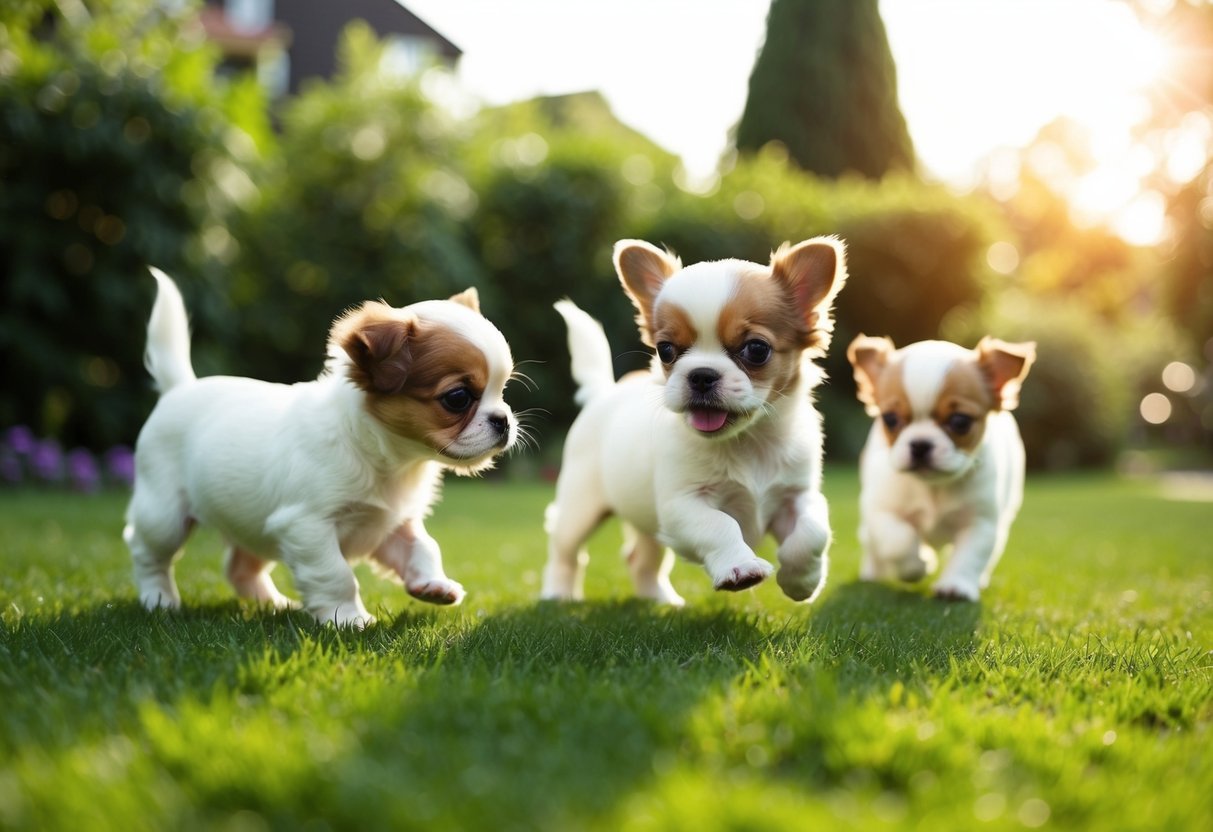
Teacup Cavaliers are known for their small size.
Most of these adorable dogs weigh less than 10 pounds when fully grown.
This lightweight makes them perfect for anyone looking for a portable pet.
You can easily carry them in your bag or let them snuggle on your lap.
Despite their tiny stature, they have big personalities.
They are playful, loving, and enjoy being around people.
When considering a Teacup Cavalier, it’s important to remember their fragile size.
Gentle handling is essential to keep them safe and healthy.
Their small weight also means they need special care, including a balanced diet and regular vet check-ups.
You want to ensure your tiny pup stays healthy and happy.
These little dogs can easily fit into various living situations.
Whether you live in an apartment or a house, they adapt well to their environment.
3) They have the same temperament as regular Cavaliers.
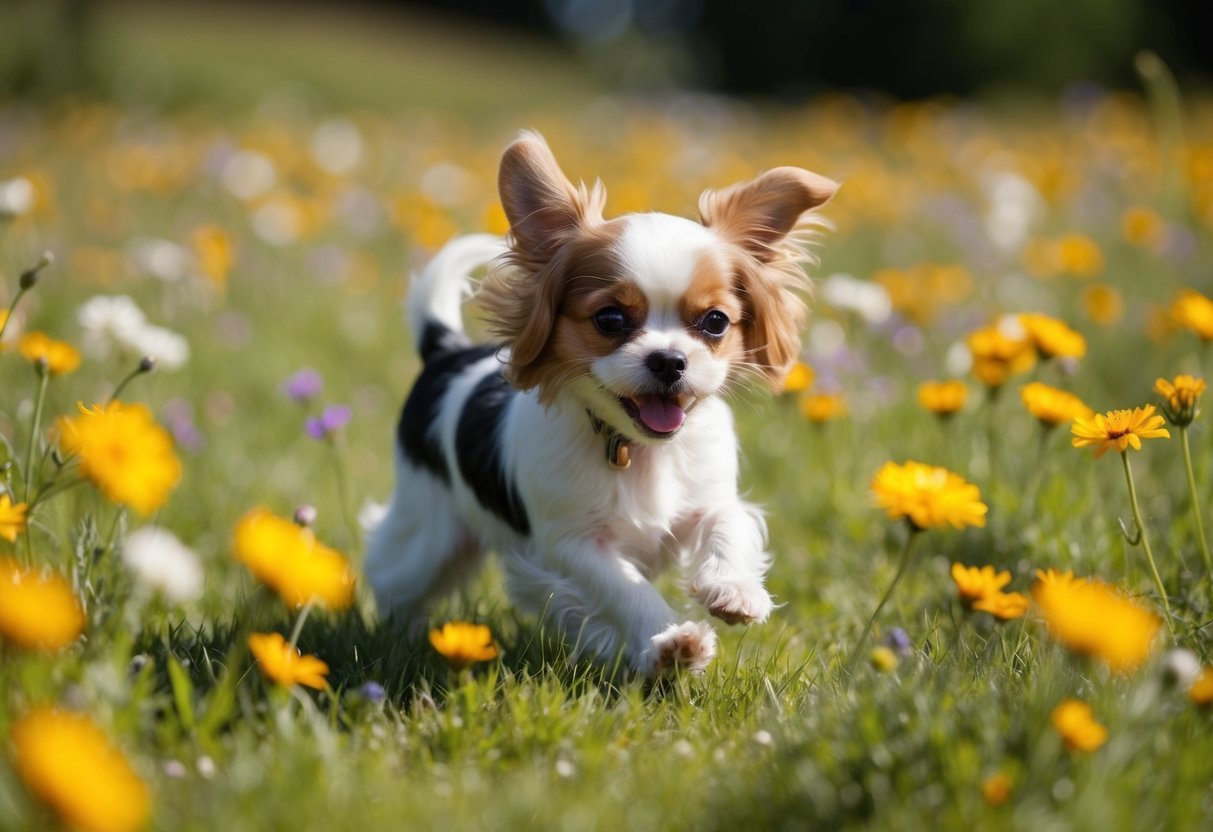
Teacup Cavaliers share the same friendly and loving nature as regular Cavaliers.
You’ll find that these small pups are just as affectionate and eager to please.
They thrive on human interaction and enjoy being part of family activities.
Their playful spirit makes them great companions for both kids and adults.
Like their larger counterparts, Teacup Cavaliers are known for their gentle demeanor.
They are social dogs that love to make new friends, whether it’s with people or other pets.
Training these little ones can be a breeze, thanks to their eager-to-please personality.
Consistent, positive reinforcement works wonders.
Be prepared for lots of cuddles and joy, as these dogs are natural lap pets.
Their charming nature adds to their appeal as a wonderful addition to any home.
4) Genetic issues are common due to selective breeding.
Teacup Cavaliers, like many designer breeds, often face health problems because of selective breeding.
Breeders tend to focus on size and appearance, which can lead to ignoring important health traits.
This practice can result in various genetic issues.
For example, you might see heart problems, like mitral valve disease.
This condition is quite common in smaller Cavalier breeds.
Eye diseases are also a concern.
Conditions like progressive retinal atrophy can cause vision loss over time.
You may already be aware that these breeds sometimes struggle with patellar luxation, where the kneecap dislocates and causes pain.
The limited gene pool can invite other serious issues as well.
Breeding for specific traits can unintentionally increase the chances of these problems in Teacup Cavaliers.
When considering a Teacup Cavalier, it’s essential to be aware of these potential health problems.
Responsible breeding practices can help reduce these risks, but it’s something you should always keep in mind.
5) Teacup Cavaliers can be more prone to heart problems.

Teacup Cavaliers are adorable, but they come with some health risks.
One of the major issues is their tendency to develop heart problems.
These small dogs can experience conditions like mitral valve disease.
This is common in the breed and can lead to serious complications if not managed.
You need to be aware that teacup Cavaliers may require regular vet check-ups to monitor their heart health.
Genetics play a big role in this issue.
Teacup versions often face more risks compared to standard Cavaliers.
Providing a balanced diet and regular exercise can help support their heart health.
Make sure to consult your vet for specific recommendations tailored to your pet.
Being proactive about their health allows you to enjoy many happy years together.
6) Their lifespan is often shorter than larger Cavaliers.
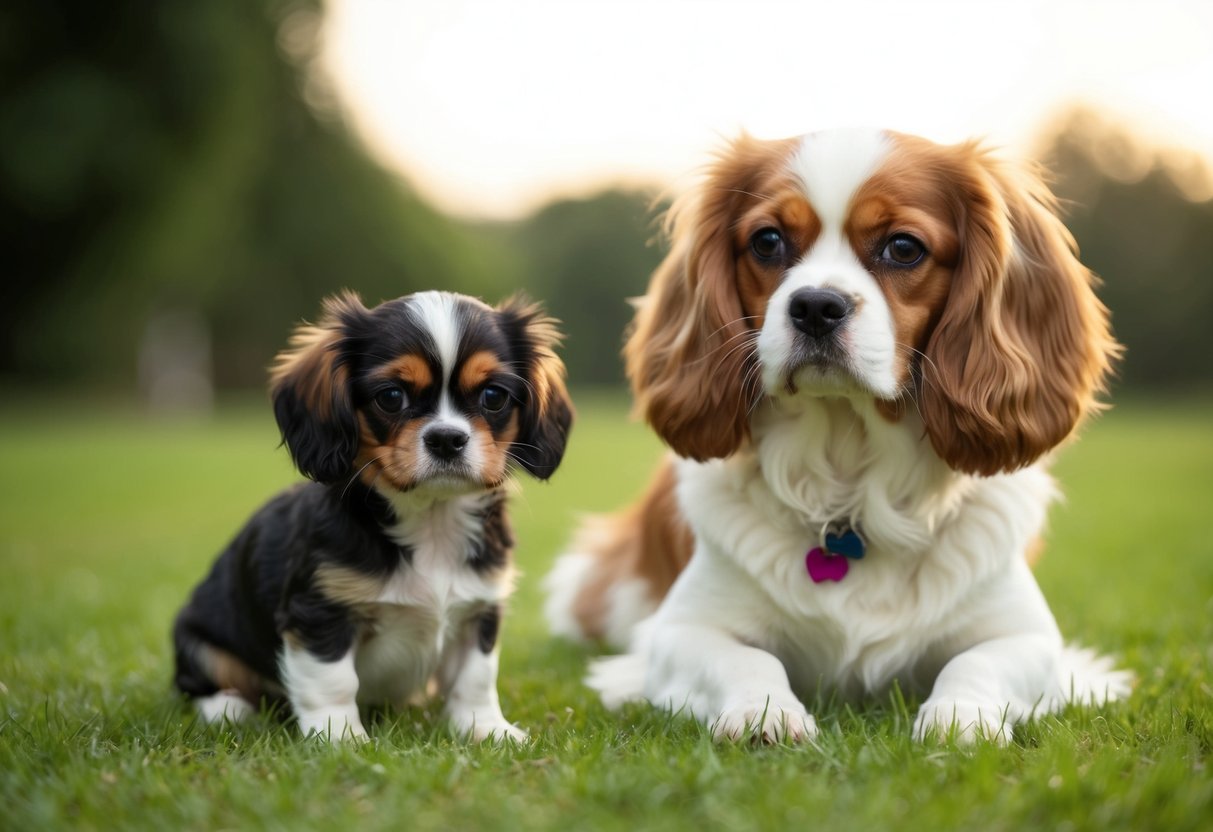
Teacup Cavaliers are adorable, but they often have shorter lifespans than larger Cavaliers.
While standard Cavaliers typically live between 9 to 14 years, teacups might only reach around 8 to 12 years.
This shorter lifespan can be due to several health issues.
Teacup dogs are more prone to certain conditions like heart problems and skeletal issues.
These health risks can impact how long they live.
When considering a teacup Cavalier, it’s important to think about their care.
Regular veterinary check-ups and a healthy diet can help extend their life.
You should also keep an eye on their activity levels.
Teacups may need gentler exercise than their larger counterparts.
This way, you can help your little friend stay healthy and happy for as long as possible.
7) Breeders may charge high prices for these tiny dogs.

Teacup Cavaliers are cute, but they can come with a hefty price tag.
You might find prices ranging from $750 to $10,000 or more, depending on the breeder and the dog’s features.
Many factors affect this cost.
For example, some breeders offer dogs with rare colors or desirable traits, which can raise the price.
The reputation of the breeder also plays a significant role in how much you’ll pay.
Remember, while lower prices may seem tempting, they may indicate potential health issues.
Always consider the care and quality the breeder provides.
Puppies that come with initial vet care, like vaccinations and microchipping, may cost more upfront but can save you money later.
When thinking about bringing a Teacup Cavalier home, be prepared for these costs.
It’s essential to research and find a reputable breeder.
This way, you can ensure you’re getting a healthy puppy that’s worth the investment.
Understanding Teacup Cavaliers
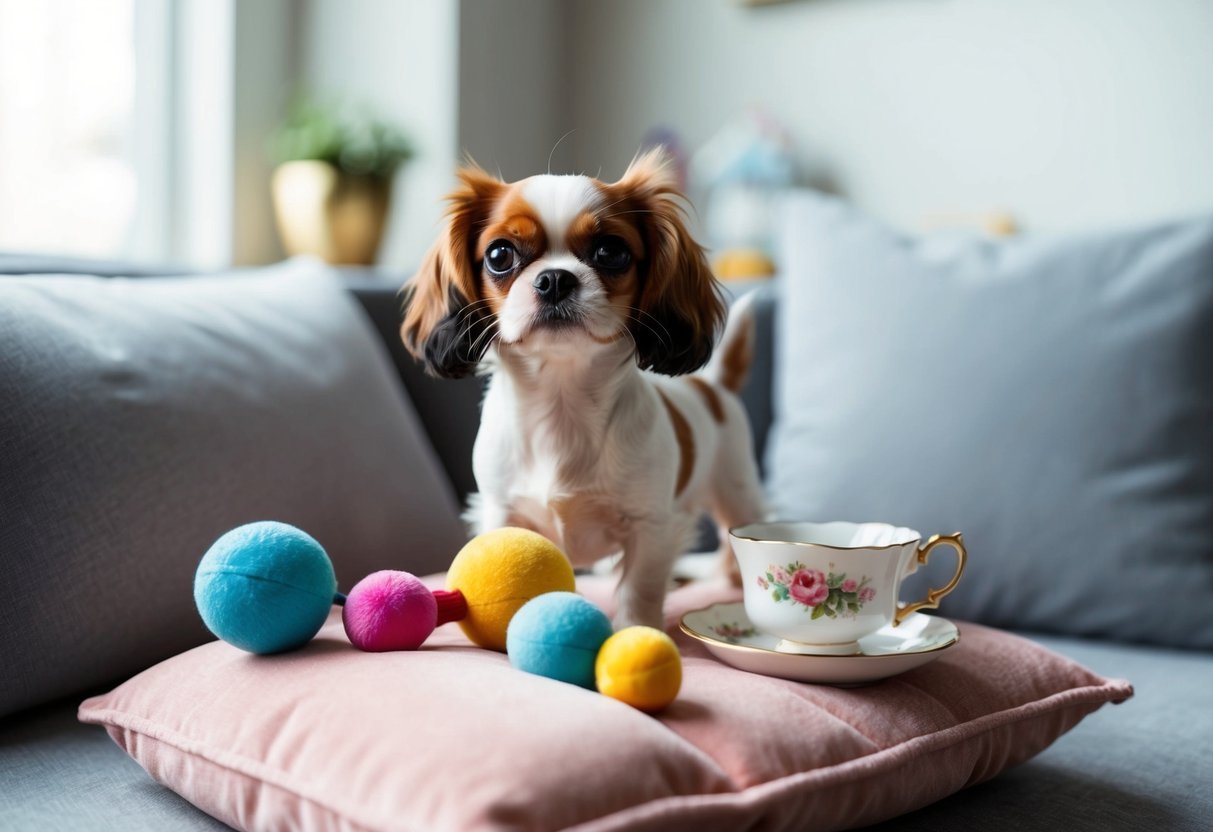
Teacup Cavaliers are a smaller version of the well-loved Cavalier King Charles Spaniel.
Their size and unique traits make them stand out among dog breeds.
Let’s take a closer look at what makes these little pups special.
What Makes Them Unique
Teacup Cavaliers typically weigh between 8 to 10 pounds.
This small size can make them cute and ideal for people in apartments or homes with limited space.
They have a lovely, gentle temperament.
Their friendly nature makes them great companions.
Many people are drawn to their big, expressive eyes and soft, silky fur.
However, their small size comes with some concerns.
Teacup breeds often face higher risks of health issues.
Mixed breeding practices can lead to these risks, making it vital to choose a responsible breeder to ensure your new friend is healthy.
History and Origins
The Cavalier King Charles Spaniel has roots that go back several centuries, tracing back to royalty in England.
Teacup versions started appearing more recently as breeders aimed to create smaller companions.
Originally, these dogs were bred for companionship.
The smaller breed gained popularity as people wanted cuter, more manageable pets.
Unfortunately, this trend also led to controversial breeding practices that can harm the dogs’ health.
As you learn about Teacup Cavaliers, remember how their breeding history impacts their well-being.
It’s important to be informed to make the best decisions for yourself and any future doggy friend.
Health and Care Considerations

When caring for teacup Cavaliers, understanding their unique health needs and proper dietary requirements is crucial.
These tiny dogs can face specific challenges that require your attention and care.
Common Health Issues
Teacup Cavaliers are more prone to various health problems than their standard-sized counterparts.
Some common issues include:
-
Heart Problems: Many teacup Cavaliers may develop heart conditions, such as mitral valve disease. Regular vet check-ups can help monitor heart health.
-
Fragility: Their small size makes them more delicate. Be cautious in handling them to prevent injury, especially when playing with larger dogs or young children.
-
Dental Issues: Tiny mouths can mean crowded teeth, leading to dental problems. Regular dental check-ups and at-home care are essential.
-
Kneecap Dislocation: Known as patellar luxation, this can occur in small dogs. Look for signs of limping or difficulty in walking.
Regular vet visits are key to catching and managing these health issues early.
Dietary Needs
Feeding your teacup Cavalier involves careful planning.
Small breeds have different dietary needs compared to larger dogs.
Here are some tips:
-
High-Quality Dog Food: Choose a balanced diet with high protein. Look for food specifically formulated for small breeds.
-
Portion Control: Due to their small size, it’s easy to overfeed. Stick to serving sizes recommended on the dog food label and adjust based on your pet’s activity level.
-
Frequent Meals: Instead of two large meals, consider offering three to four smaller meals a day. This helps prevent hypoglycemia, a common risk for small dogs.
-
Hydration: Always ensure fresh water is available. Tiny dogs can get dehydrated quickly.
By focusing on these aspects of health and nutrition, you can support your teacup Cavalier’s well-being.
Training and Socialization
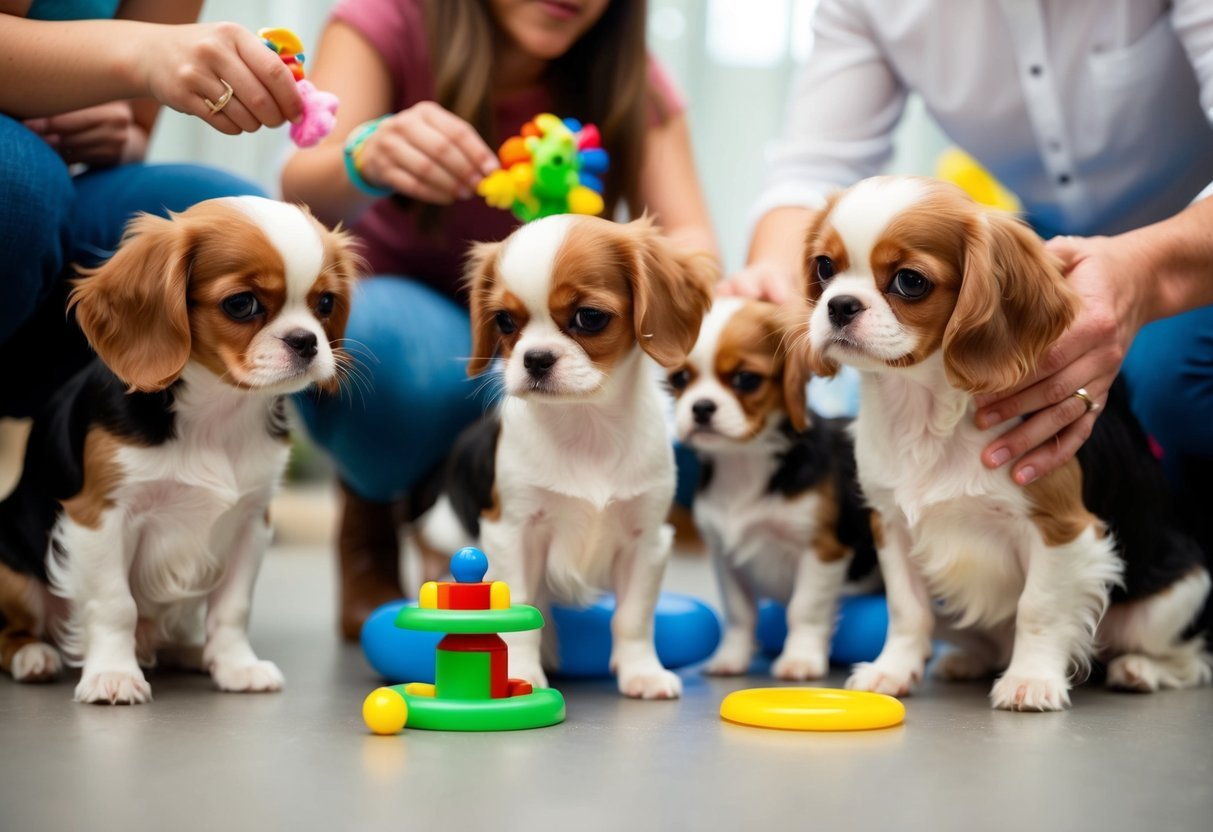
Training and socialization are essential for your Teacup Cavalier to grow into a well-adjusted companion.
These little dogs are intelligent and eager to learn, making training both rewarding and fun.
Socialization helps them become comfortable in different settings and around various people and pets.
Behavioral Characteristics
Teacup Cavaliers are known for their gentle and affectionate nature.
They tend to bond closely with their owners and thrive on companionship.
Because of their small size, they may display a bit of fearfulness if not properly socialized from an early age.
This can lead to timid behavior around larger dogs or unfamiliar environments.
It’s crucial to expose them to various sights, sounds, and experiences.
Regular outings, like trips to the park or visits to friends’ homes, will help your Teacup Cavalier build confidence.
This early exposure can prevent future behavioral issues and create a well-rounded dog that enjoys meeting new friends.
Effective Training Tips
When training your Teacup Cavalier, positive reinforcement is key.
Use treats, praise, and playtime as rewards for good behavior.
This method encourages your dog to repeat those actions.
Start with basic commands like “sit,” “stay,” and “come.” Keep sessions short and fun to hold their attention.
Aim for 5-10 minutes a day.
Consistency is also essential.
Use the same commands and hand signals each time.
Gradually increase the difficulty as your dog masters each command.
Don’t forget about socialization training too! Puppy classes are a great way for them to meet other dogs and learn how to behave in different settings.
Frequently Asked Questions

Teacup Cavalier King Charles Spaniels bring joy and companionship, but they also come with unique considerations.
Below are important questions you might have if you’re thinking about adding one of these tiny pups to your family.
What are the common health concerns for teacup Cavalier King Charles Spaniels?
Teacup Cavaliers can face several health issues.
Heart problems, such as mitral valve disease, are common in this breed.
Additionally, eye conditions and patellar luxation, which affects the kneecap, also occur due to their small size and selective breeding.
How does the lifespan of teacup Cavaliers compare to regular-sized ones?
Teacup Cavaliers generally have a lifespan similar to regular Cavaliers, averaging around 9 to 14 years.
However, their smaller size can sometimes lead to more health complications, which might shorten their lifespan.
Are there any major differences between King Charles Spaniels and Cavaliers?
Yes, there are differences between the two.
The Cavalier King Charles Spaniel is a smaller version of the King Charles Spaniel.
The Cavalier is known for its friendly temperament and lively nature, while the King Charles Spaniel has a longer history and different physical traits.
What should potential owners know about the pros and cons of teacup Cavaliers?
Teacup Cavaliers are adorable and tend to have the same affectionate nature as regular Cavaliers.
However, they often face more health problems due to their size.
It’s important to consider these factors when deciding if this breed is right for you.
Where can you find reputable teacup Cavalier King Charles Spaniel breeders?
Finding a responsible breeder is essential.
Look for breeders who prioritize the health and well-being of their dogs.
You can check breed clubs or rescue organizations for recommendations to ensure that you are getting a healthy puppy.
What rescue options are available for teacup Cavalier King Charles Spaniels?
Rescue organizations can be a great option for adopting a teacup Cavalier.
Many breed-specific rescues take in dogs that need homes.
This can provide a loving solution while giving a dog a second chance.

